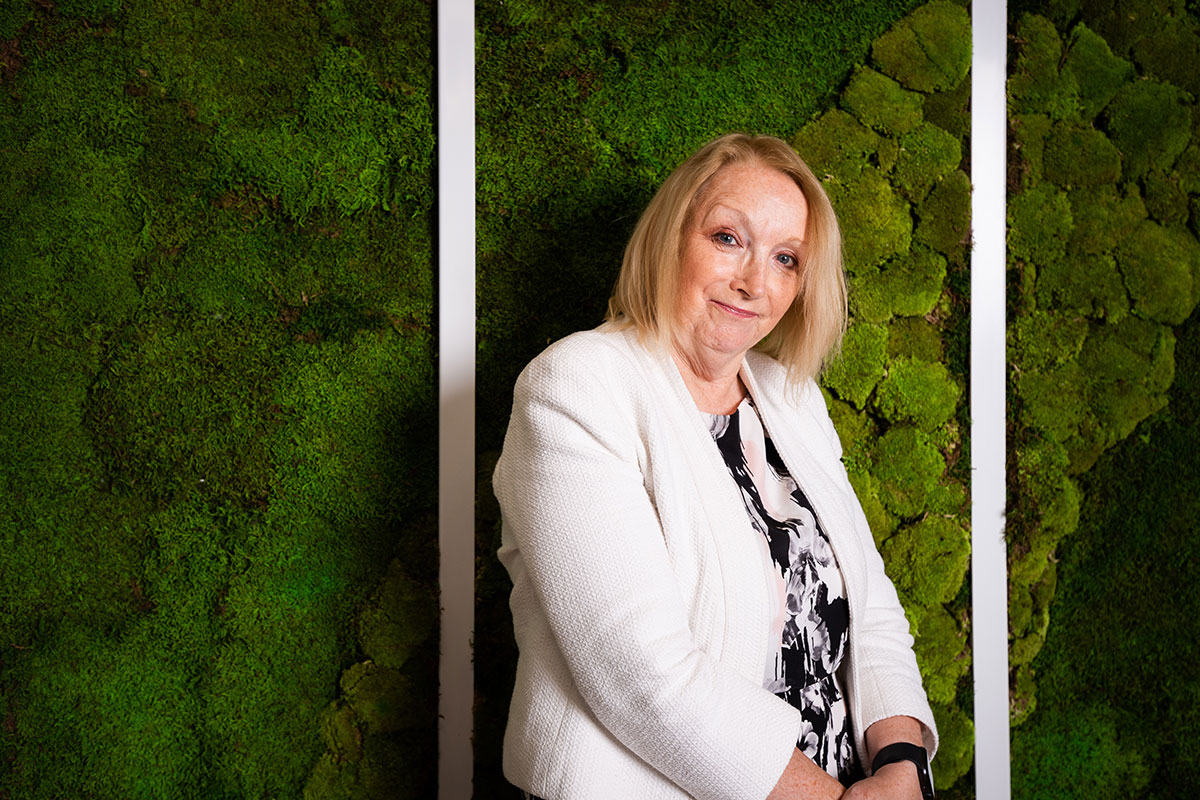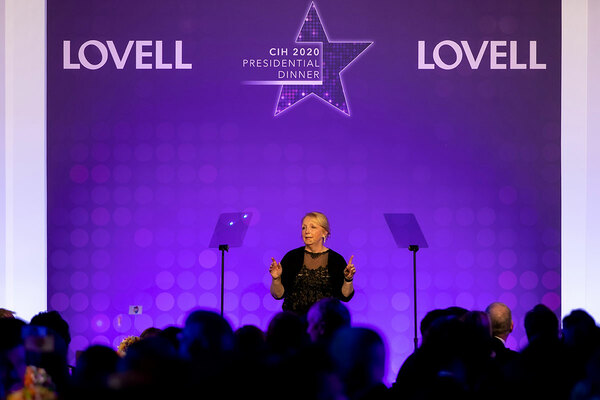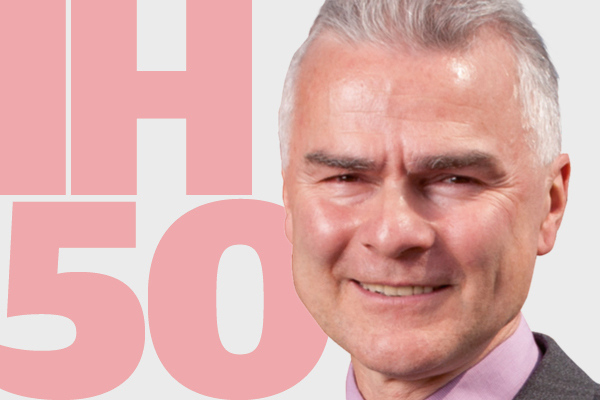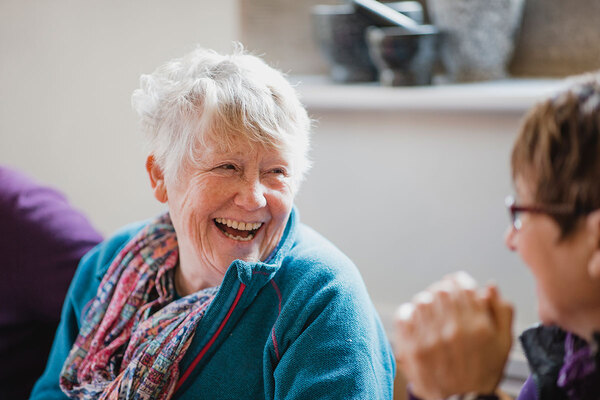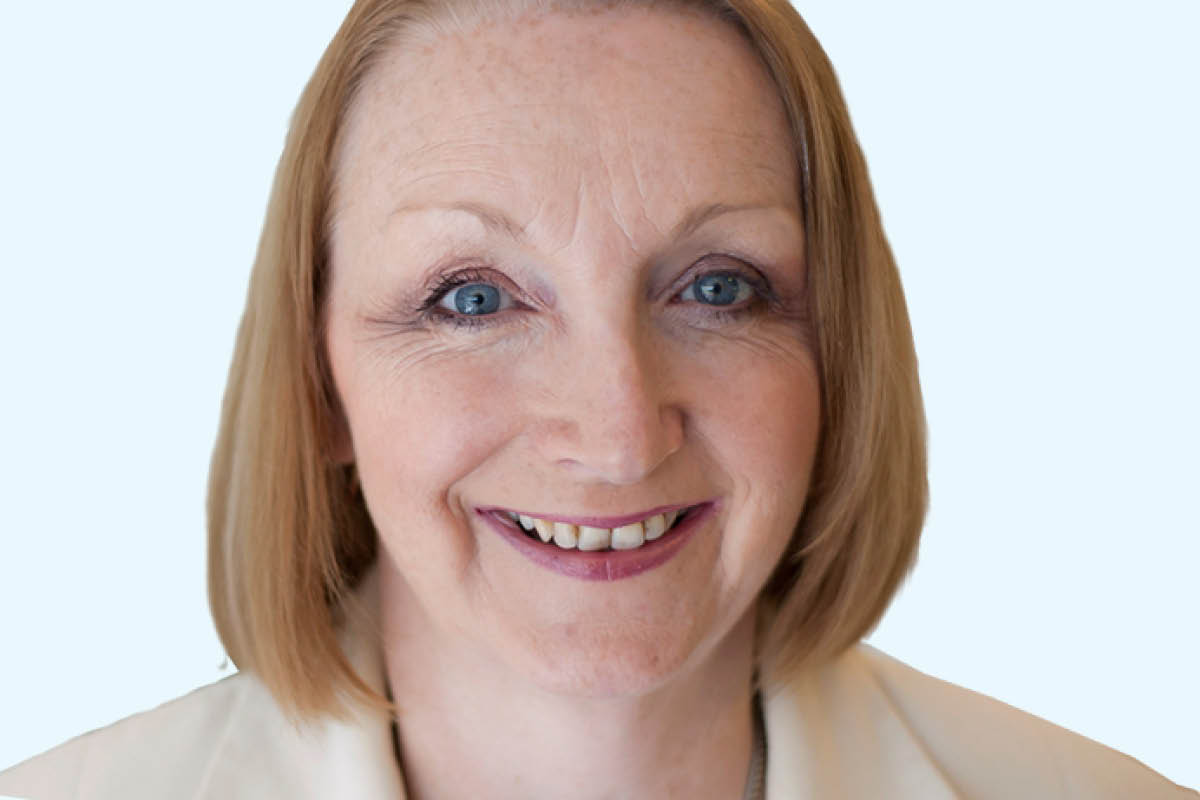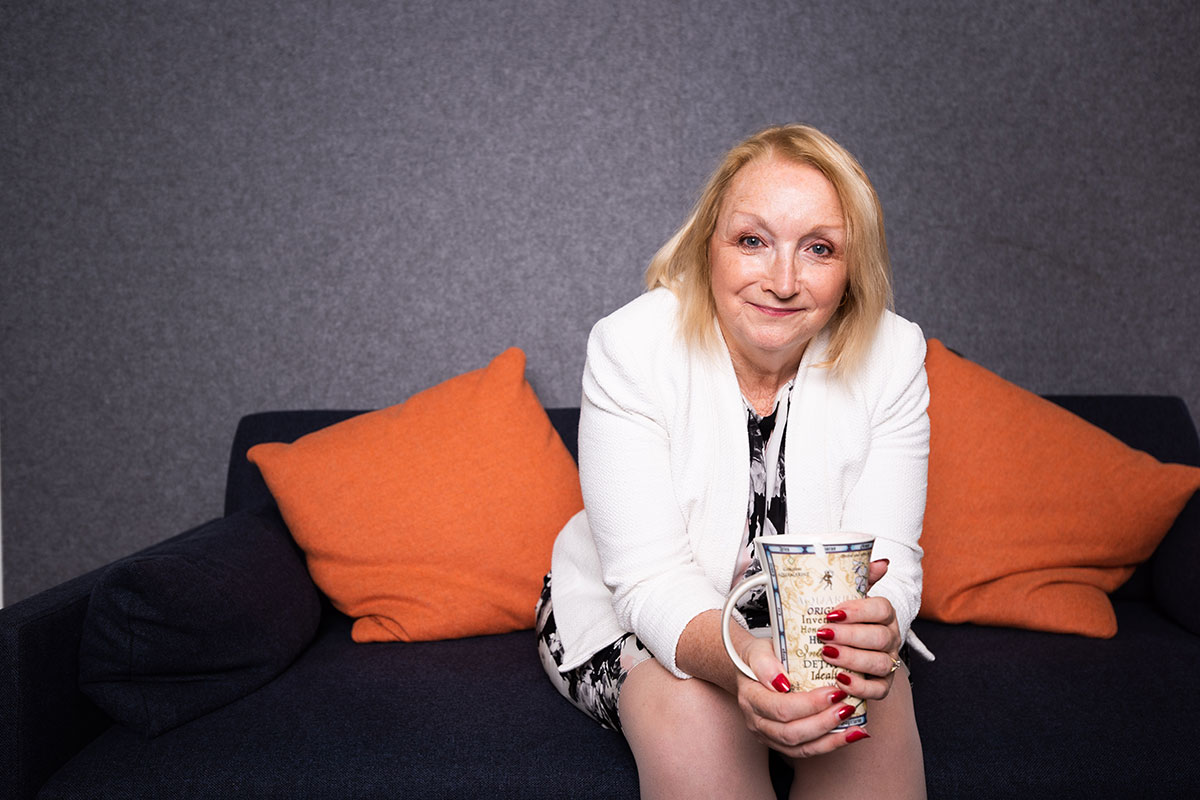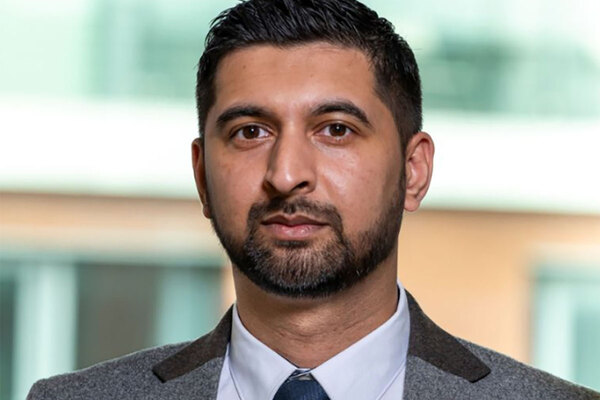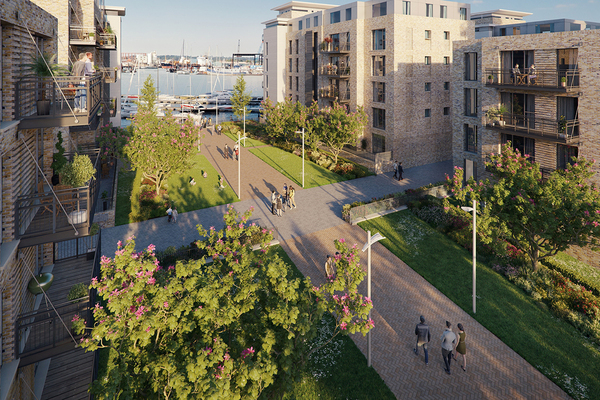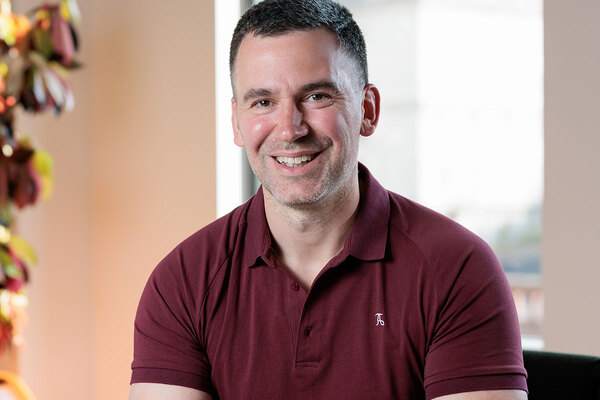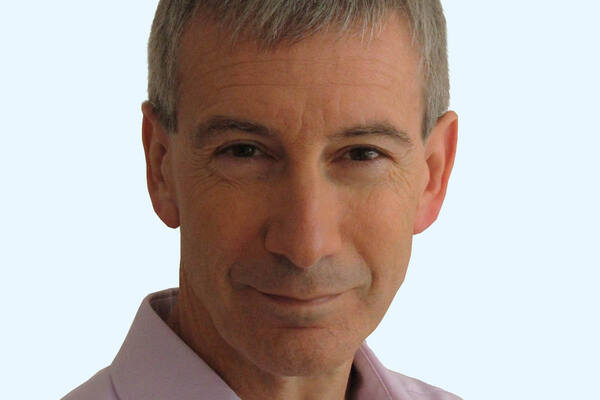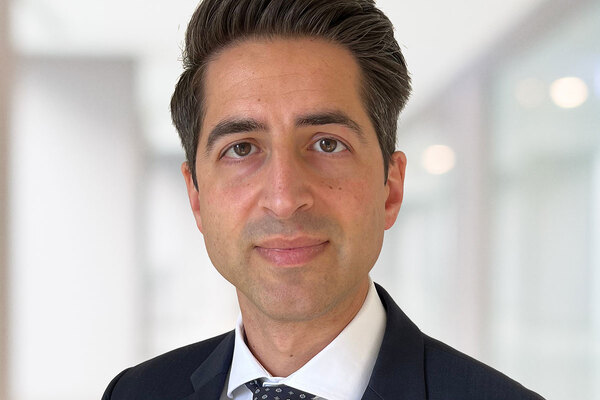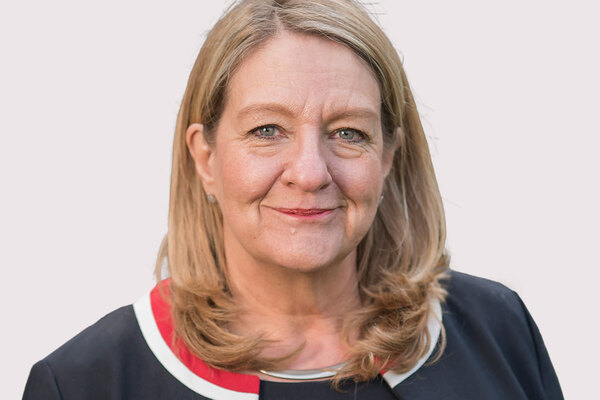You are viewing 1 of your 1 free articles
‘We need to talk about mental health’ – interview with CIH president Aileen Evans
Aileen Evans wants her presidency of the Chartered Institute of Housing to shine a light on the way the sector approaches mental health. Martin Hilditch finds out what she wants to achieve and why it is such a personal campaign. Photography by Simon Brandon
Aileen Evans is thinking big when it comes to her new role as president of the Chartered Institute of Housing (CIH). “I want to leave a legacy,” she states, when we meet up amid the hubbub of a central London coffee shop.
“I want to do something substantial. Because I think there is an opportunity to make things better.”
More specifically, Ms Evans, who is also chief executive of 12,000-home Grand Union Housing Group, thinks the sector needs to improve its approach to dealing with mental health. So far, she has been using her platform to highlight Office for National Statistics figures which show that the number of suicides among people working in construction is the highest of any profession.
She is looking to kick-start a conversation about the issues that impact on the mental health of people who live and work in social housing. She also wants to help create a professional environment where people are more comfortable talking about their mental health.
Inside Housing meets up with Ms Evans to find out why she feels so strongly about this issue – and how she hopes to get more people to open up.
It seems Ms Evans’ campaigning spirit (she is a founder member of Social Housing Under Threat, the campaign to save social rented housing) and belief in the importance of education and learning date right back to her childhood in Hucknall, a small former mining town just outside of Nottingham. The family’s experience during the miners’ strike in the 1980s, along with her father’s broader dislike for his job, still haunt her to this day.
“We are all a product of the past and all those experiences shape us,” she acknowledges. “Not having food during the miners’ strike shaped me. You know, my dad not working – well, he did work unofficially because a mate gave him building work and that is how we ate, but having free school meals because my dad was on strike. Being shouted at in the street when the power cuts came because there was no coal.”
In the febrile environment of the 1980s, her Irish mother was also the target of occasional abuse, she adds, “by people blaming her for the IRA”.
All of which left Ms Evans with “a raging sense of injustice really, that the world wasn’t a fair place”.
“The world still isn’t a fair place,” she adds. “But there is something [important] about doing your bit then to try and help it be a bit better.”
This ethos has certainly been a driving force behind Ms Evans’ career to date, as well as her new campaign. On top of raising money for mental health charity Mind, she wants the campaign, called Shine a Light, to focus on spreading good practice.
The strong belief in the importance of learning springs out of her childhood experiences, too.
Related Files
“My mum and dad were not slouchers,” she states. “They were clever people but they had no opportunity. My father was a clever, thoughtful, articulate man, but he was painfully shy. So he ended up 35 years down a coal mine… He absolutely hated it every single day. But it put food on the table.”
Both her mum, who worked as a hospital receptionist, and dad “worked hard and did stuff they weren’t particularly comfortable with to make sure we [the children] were alright”, she adds.
“The thing I took from that is the value of education. It gives you choices. I’m really privileged to have these choices. I mustn’t squander them.”
It’s difficult to imagine Ms Evans squandering anything. She talks about both work and her family with a warmth and passion that makes you feel that this is someone who is determined to make the most of every minute. This perhaps is a product of her background, too – both the loving family environment but also an appreciation of the fragility of life. The latter point has led directly to the campaign.
“I always knew I wanted to talk about mental health,” Ms Evans says of the moment she first thought about standing to become president.
When asked why, she starts by talking about the moment her dad’s best friend killed himself when she was five.
“He was a happy, smiley, life and soul of the party person,” she says. “Nobody knew he was ill. It was a complete surprise. My dad never, ever really recovered from that. When I was 15, my dad attempted suicide. Because of being trapped in a job he hated. Being thwarted in the person that he wanted to be, in not having the life that his brain told him he could have had.”
Ms Evans’ husband has also suffered from mental health problems, and Ms Evans states bluntly that “I know my mental health has been shit at times”, too. At one point, when her husband was ill, she says she “lost a load of weight, I didn’t sleep properly but it was only kind of down the line that I recognised I needed some counselling and got some support”.
Ultimately, it is this last point that Ms Evans wants to inform the message of her campaign. “Sometimes all of us need a bit of support,” she states. “Sometimes some of us need a bit more support. I think it is framing it in a context that says, ‘It is alright to ask for it. You don’t have to be brave and soldier on.’”
In her own workplace, fostering a supportive environment has involved Ms Evans blogging about her own mental health in order to reduce stigma and encourage others either to open up or seek support.
Ms Evans also thinks the sector should take direct action to tackle the worrying number of suicides in the construction industry. While contracts typically have “reams” of health and safety requirements, mental health plans should become more widespread, she thinks.
Six standards for social housing providers on mental health
Picture: Getty
Commitment one: Prioritise mental health in the workplace by developing and delivering a systematic programme of activity
Commitment two: Proactively ensure work design and organisational culture drive positive mental health outcomes
Commitment three: Promote an open culture around mental health
Commitment four: Increase organisational confidence and capability
Commitment five: Provide mental health tools and support
Commitment six: Increase transparency and accountability through internal and external reporting
Source: Mind report for the Chartered Institute of Housing (published on the evening of 5 February)
“We can raise awareness, but actually we can force contractors to do it by making a contractual condition,” she adds.
Then there is the welfare system, which Ms Evans thinks needs fundamental reform. At the moment it is piling unnecessary stress on people and making them mentally unwell on a mass scale, she suggests.
Grand Union assists tenants to appeal against decisions to turn down Personal Independence Payments (for people with long-term ill health or disabilities). At the moment she says 80% of the appeals it deals with see the original decisions overturned.
A close family member has had exactly the same experience, she adds. “I have seen it first hand. The system is crap. Completely dysfunctional. It stinks. It isn’t fit for purpose.”
While part of that involves pushing for change centrally, she also wants to encourage landlords to do more to assist tenants in appealing against decisions. “It is a necessary part of being a landlord these days,” she states.
For now, though, her number one goal is to encourage the sector’s leaders to talk more openly about mental health. This week marks a major moment in the campaign, with the launch of a new piece of work that the CIH has been carrying out with Mind to create a mental health guide for the social housing sector.
The guide, suggests social landlords adopt six ‘standards’ to better support employees’ mental health (see box above).
These include creating a mental health at work plan, monitoring employee health and well-being, and training line managers on mental health and stress management – with clear guidelines for managing mental health issues.
The guide also suggests that leaders in the sector should promote employee well-being by speaking out about mental health – destigmatising mental health issues and fostering a supportive environment at the same time.
Clearly Ms Evans is a walking exponent of this approach. Is opening up in this way not a difficult thing to do, though? “I’m still not entirely comfortable, but I am getting more comfortable,” she states. “Because, actually, I recognise how important it is.”
Whenever she blogs about mental health she says she will always get emails from staff opening up. For this reason she feels it is important for leaders in the sector to open up where they feel able to do so.
“I don’t buy this stuff that people expect their leaders to be all powerful and alright all of the time,” she says. “That is not real. That is not what the world is like.”
She adds that “if people use the guide, that’s great”.
“But actually, if we just get leaders in organisations talking about how they feel, helping other people to do the same and creating organisations where it is OK to say that you are not OK, then my work is done.”
Update: 3.31pm 5.2.20: This article was updated to include a link to the guide, which was published this afternoon
If you have been affected by any issues in this article, the Samaritans provides confidential emotional support for people who are experiencing feelings of distress or despair. Call them free on 116 123 or visit www.samaritans.org.
To support the presidential campaign visit www.justgiving.com/fundraising/cih-housing.
